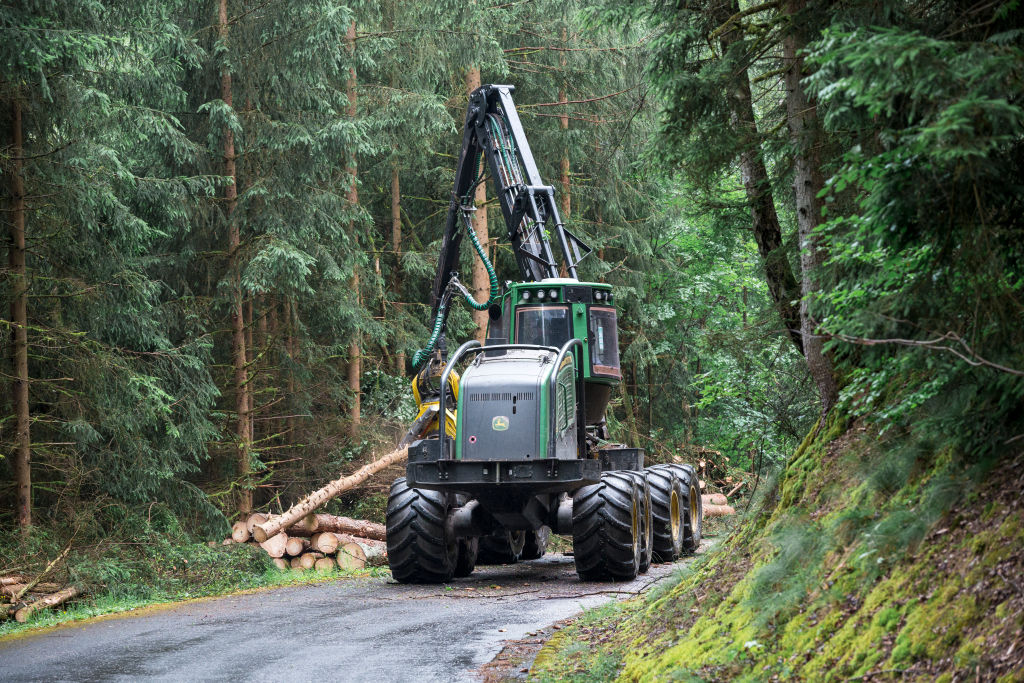Anthony Harwood is a former foreign editor of the Daily Mail.
For new legislation bearing all the hallmarks of those words ‘Classic EU Fudge’ it’s hard to beat the trading bloc’s sustainability laws, which just keep getting watered down.
Consider the sheer chutzpah of calls last week by Emmanuel Macron and Friedrich Merz to scrap due diligence rules requiring companies to monitor their global supply chain for human rights abuses and environmental damage.
The French and German leaders are repeating demands first spouted by the far right for the legislation to the scrapped – along with the rest of the EU’s Green Deal.
Strange bedfellows indeed but an indication of how Europe has tilted right and moved the goalposts with the Omnibus Simplification Package’s less ambitious environmental targets.
The starkest example of this backing away from its lofty, earlier commitments is the EU’s anti-deforestation laws. These didn’t just get watered down. They aren’t even getting off the ground, having been postponed at the eleventh hour in December and now facing calls for a further delay.
The EU is also being accused of favouritism towards member states while penalising Asian countries who say they have been marked down as drivers of deforestation based on outdated data.
The EU Deforestation-free Regulation (EUDR) was passed with great fanfare two years ago, hailed by environmentalists for its pledge to cut global deforestation by 10%. It would ensure that commodities such as cocoa, coffee, palm oil, cattle, soy, rubber and wood could not be sold on the EU market if they had been sourced from deforested land after 2020.
Since the December delay, when member states as well as suppliers complained they weren’t ready for the bureaucracy (despite having 18 months to prepare), the European Commission has set about making everything more palatable.
In March, its Omnibus bill watered down rules on corporate sustainability reporting and supply chain transparency to make the bloc more competitive with the US and China. This would save Europe’s SME’s €6.3 billion in admin costs they would have incurred meeting sustainability information requests and excluded 80% of companies from the Corporate Sustainability Reporting Directive (CSRD).
Last month, in a sop to reluctant member states, the Commission placed all 27 countries in a ‘low risk’ category for deforestation despite some, like Sweden and Finland, having appalling records for chopping trees down.
Sweden has the most ‘old growth’ forests in Europe, covering 70% of its territory, but these are getting torn down faster than the Amazon, while Finland has faced €7 billion in EU fines for deforestation.
It led to palm oil-producing Malaysia – which reduced primary forest loss by 65% between 2014 and 2023 with a further drop of 13% in 2024 alone – accusing the EU of ‘favouritism’ after it was placed in a ‘standard risk’ category.
The benchmarking determines the amount of costly and bureaucratic due diligence reporting which will be required for goods coming into the EU. Malaysia’s Commodities Minister Johari Ghani said its ‘standard risk’ rating was based on outdated data from 2020, since when the country has introduced measures to justify a ‘low risk’ rating. He asked the EU to come and see for themselves, which they are going to do.
As well as fudging things to keep member states onside, the European Commission stands accused of a lack of transparency, with crucial decisions being made behind closed doors in Brussels.
Just four countries – Belarus (where IKEA has been exposed for sourcing wood for its furniture), Russia, Myanmar and North Korea – have been categorised as ‘high risk’; 140 were labelled ‘low risk’ and 50 ‘standard risk’, but with no explanation of how the ratings were determined.
For some member states, even ‘low risk’ is still too high. At least 11 of them, including Finland, want a ‘no risk’ category to eliminate checks altogether, while 19 are pushing for more watering down of EUDR and even a second postponement.
These efforts, framed as attempts to ease the administrative burden on business, are effectively dismantling one of the EU’s most important environmental laws.
It’s classic EU fudge paying lip service to the fight against climate change at a time of widespread forest degradation and illegal logging in Europe when the trading bloc wants to remain credible as a global environmental leader.
